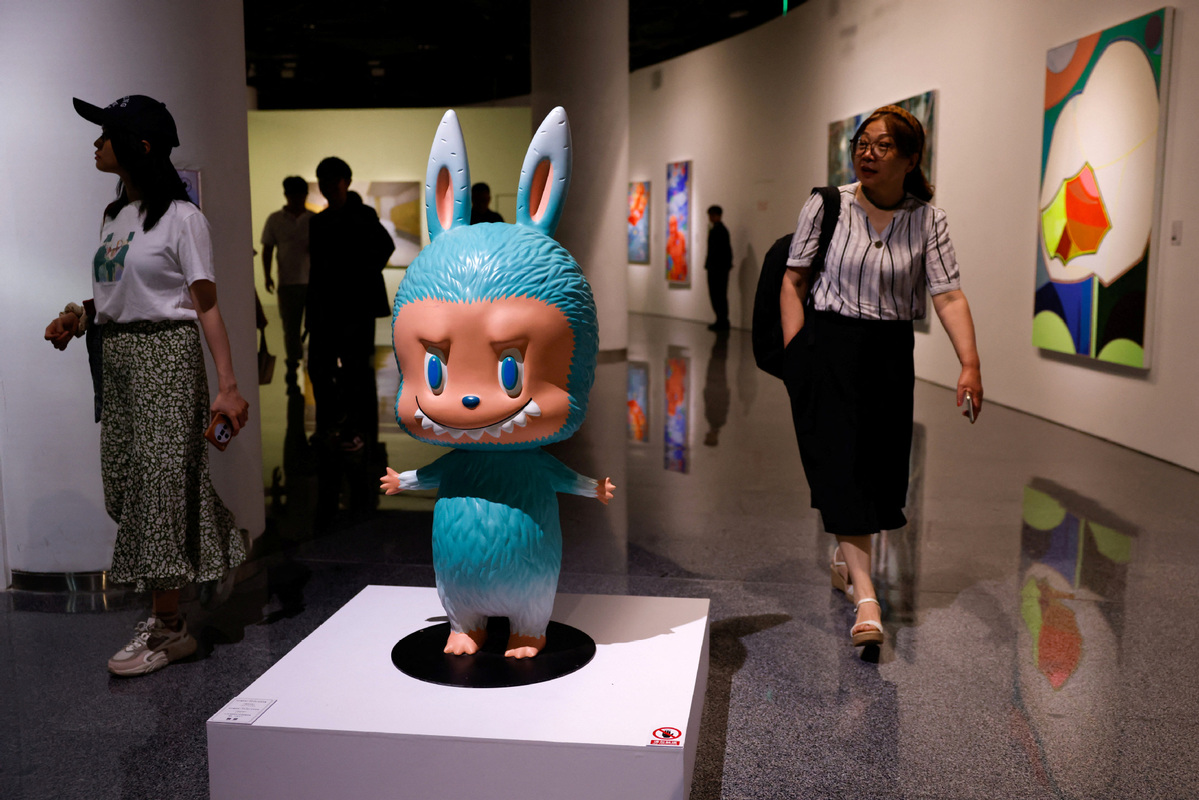Labubu and beyond -- Decoding the rise of China's 'IP economy'


BEIJING -- Until this year, few could have anticipated that a quirky, toothy plush doll would capture the hearts of social media users worldwide and ignite a global shopping frenzy. Labubu, created by Chinese toymaker Pop Mart, is becoming a new icon in the "intellectual property (IP) economy," a thriving sector within China's dynamic economic landscape.
As a buzzword in China, the IP economy refers to the process of converting intangible cultural assets -- such as stories, characters and brands -- into a variety of products and services. The sector spans film and television, gaming, animation, cultural creations, consumer goods, and many other fields.
As a latest example of the IP economy, Labubu is rapidly evolving from a pop culture phenomenon to a highly lucrative collectible that is taking the global market by storm. What stunned the world recently was a mint-green Labubu doll, which sold for over 1 million yuan ($139,794) at an auction in Beijing. Fueled by robust demand for the doll, Pop Mart's revenue soared by 165 to 170 percent year-on-year in the first quarter of 2025.
Together with various successful Chinese IPs such as the movie "Ne Zha 2" and the video game "Black Myth: Wukong," Labubu has exemplified a burgeoning trend in China: the transformation of culture and creativity, bolstered by cutting-edge technology, into business opportunities across a diverse range of sectors.
TECH-DRIVEN CULTURAL RENAISSANCE
With a history spanning over 5,000 years, China boasts a wealth of cultural treasures. However, revitalizing traditional culture in a modern way that appeals to younger generations, who are becoming a major consumer group, remains a challenging task.
Thanks to its innovation-driven development strategy and impressive technological advancements, China has blazed a new trail for cultural revival: transforming cultural classics into IPs with the help of advanced technologies.
The transformation, according to Wang Linsheng, a researcher at the Beijing Academy of Social Sciences, cannot be completed by merely copying ideas and concepts or presenting classics in a digital way. Rather, it is a process of reimagining cultural classics to breathe new life into these timeless treasures.
"Supported by digital technology, China is combining cultural classics with modern ways of IP management, in a bid to transform traditional elements into products in line with the latest aesthetic trends and consumer demands," Wang said.
A case resonating with Wang's remarks is "Black Myth: Wukong," a game inspired by the classic Chinese literary masterpiece "Journey to the West." While unfolding the legendary adventures of Sun Wukong, also known as the Monkey King, the game utilizes a range of advanced visual technologies to provide lifelike scenes and immersive experiences for players of all cultural backgrounds.
Through its technological reimagining of a classic Chinese story, the game has transcended cultural boundaries and become a global hit. On its official release day, "Black Myth: Wukong" climbed to the top of the charts on Steam, the world's largest gaming platform, and has dominated many other gaming markets worldwide ever since.
Commenting on how technologies are fueling China's ongoing IP boom, Chen Gang, an analyst with Soochow Securities, noted that cutting-edge technologies such as 5G and cloud rendering are helping the country overcome the temporal and spatial limitations of traditional communication methods, thereby enabling Chinese cultural and entertainment products to reach a wider audience.
In recent years, culture-related sectors have emerged as a robust catalyst for China's economic growth. According to the National Bureau of Statistics, the country's per capita expenditure on education, culture, and entertainment reached 3,189 yuan in 2024, marking a 9.8 percent year-on-year increase and accounting for 11.3 percent of total per capita consumption spending.
While highlighting the role of the IP economy in driving broader economic growth, Wang said that IPs extend beyond the scope of just culture or entertainment. Transforming cultural classics into IPs should be based on contemporary industrial development models, he said, adding that the process also involves various upstream and downstream sectors related to digital media.
INDUSTRIAL CHAIN IN THE MAKING
Continuing to unleash its vast growth potential, China's IP economy is fostering an industrial chain that involves an increasing number of upstream and downstream companies working together to create high-quality products.
Already the highest-grossing film in Chinese history, "Ne Zha 2" is creating a ripple effect across a wide range of sectors. To date, more than 10 types of derivative products related to the movie have been planned and launched.
Earlier this year, Pop Mart launched a series of Ne Zha-themed blind box toys in its Tmall store, a major Chinese online shopping platform. Just eight days after its release, the series had generated over 10 million yuan in sales, becoming one of the most sought-after toy collections at the time. Additionally, other related merchandise, such as collectible cards and plush toys, has also gained significant popularity.
By promoting industry integration centered on original IPs, China is well-positioned to establish a complete industrial chain that spans online literature, film and television, gaming, and derivative products, said Hong Tao, vice chairman of the China Consumer Economics Society.
"This full industrial chain development model can expand the application scenarios of intellectual properties and help bridge the virtual world and reality, thereby generating more business value and economic benefits," Hong said.
To this end, analysts have suggested that the country should facilitate the alignment of all segments of the industrial chain. This can be achieved by integrating independent IPs and developing them in a systematic and coordinated manner.
"Chinese IPs can draw experience from the Marvel universe, which brings together various superheroes in one unified narrative framework," said Chen, adding that the growth model of the American pop culture icon has shown a way to enhance the linkage and coordination among different IPs.
Looking ahead, Wei Pengju, a scholar at the Central University of Finance and Economics, said that China should embrace global cooperation in the development of its original IPs. "By doing so, the country can fully leverage its IP resources and establish an international IP framework that integrates both cultural and economic values," Wei added.





































